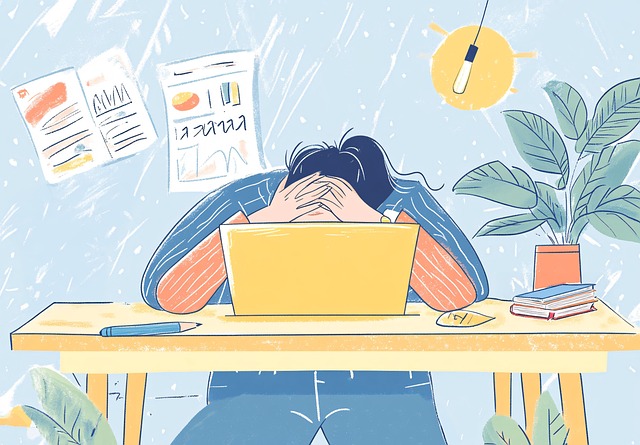Overcoming Burnout
2025. 3. 25.

Have you ever suspected you might be experiencing burnout?
In Korea, there's a tendency to be indifferent towards mental health, often considering it something shameful. As a result, many people ignore the symptoms.. They dismiss it as nothing serious, thinking a drink or the passage of time should resolve everything. If you can't overcome it, you might feel weak. We hold up a shield of needing to be strong, pretending not to notice the cuts and stabs we're enduring behind it. We act like we're fine, even offering advice or comfort to others, while barely holding ourselves together.
If you search for articles about burnout, you'll find various causes discussed. Some simply attribute it to overworking.
From the perspective of someone who's been through it, burnout seems to be a symptom that arises when it becomes difficult to separate work from daily life. Of course, working too much can be a problem, but even after finishing work and heading home, your mind remains preoccupied with work-related worries and concerns. Your body may have left the office, but your mind is entirely focused on work. You try to relax by watching TV, but you can't concentrate; you're just staring blankly, neither truly resting nor working. Procrastinating until tomorrow would be ideal, but you can't seem to do it.
As days like this repeat, you start to feel trapped in an endless cycle of instability. When this feeling persists, eventually, the thread of mental resilience you've been holding onto snaps. At least, that's how it felt when I look back on my experience.
A 12th-Year Developer Falls into Burnout
It feels like quite a while ago now. In the spring of 2018, on my way to work, taking the subway to Pangyo Station and then the bus towards my office, I looked out the window and suddenly felt a sense of lethargy.. I don't know exactly when it started, but it was something I realized in an instant. It was like the saying "a drizzle soaks your clothes"; the lethargy had been gradually weighing me down, slowly drenching my entire being. It was the moment when the last teetering domino finally, barely, fell over, making me think, "Huh?". My body and mind felt as heavy and suffocating as a rain-soaked cardboard box.
It was strange. At the time, I had no apparent problems. I was recognized at work, perhaps even beyond my abilities, and the compensation was satisfying. I exercised relatively diligently, and there were no major issues at home.
My current profession as a developer, or programmer, had been my dream since middle school, and I genuinely enjoyed the work. I always wanted to do better. I lived a life of effort and enjoyed it.
As the lethargy grew, everything that used to fill my days with interest and fun began to feel futile. Nothing was enjoyable anymore. The thought "What's the point of doing this?" overwhelmed me with helplessness. I started hating waking up in the morning, and on weekends or holidays, I would just lie in bed for hours. I used to be the kind of person who felt guilty for spending free time meaninglessly, always overflowing with things I wanted to do and never having enough time. But it was as if that person never existed; I found it difficult to do anything. Fortunately, I managed to function adequately at work. I wore an appropriate mask and held on.
I thought a short break would make it better. But there were no signs of improvement. I realized something was wrong and looked into it; the symptoms I was experiencing were burnout. I had heard the term burnout many times, but I never thought it had anything to do with me. Yet, this unwelcome guest had found its way to me.
It had been just about 12 years since I started my career as a programmer, and less than three years since my daughter was born. It was a time when I should have been working hard.
Even though I loved my job, there were many moments when work felt difficult and overwhelming. Still, I thought I had navigated those challenges well and felt I had grown because of them. All those tough times had passed, so why then? I found out that burnout often arrives not during the storm, while you're struggling to navigate rough seas, but rather when the storm has passed and things have calmed down. Although I tried not to show how hard it was, a fear crept in: What if another challenging task comes up? What if I can't handle it well?. Perhaps the accumulation of such fears manifested as burnout?
In the past, I would have likely underestimated burnout and thought I could overcome it with sheer willpower. But at that time, my mental energy was completely depleted, and I didn't even have the capacity for such thoughts. It felt like wearing waterlogged clothes. My mind was foggy. Realizing my mental energy was depleted made me fully grasp that mental energy is a real, tangible resource.
Ultimately, I concluded that the old approach of charging forward recklessly wouldn't work.
Habits to Overcome Burnout
First, I decided I needed a break, so I took about two months of parental leave, partly to care for my child. I focused on finding leisure. During that time, I stopped everything related to work. Since I had almost exclusively read work-related books, this situation led me to read books I normally wouldn't. I read a lot about brain science, depression, mindfulness, and life.
I also tried visiting a hospital. I went twice, but both times it was so crowded that I couldn't even make an appointment. My goodness... there were so many people seeking psychiatric help. Reputable places had queues forming from dawn. It seemed like chasing after hospital appointments would just exhaust me further. (However, I absolutely recommend seeking medical help for faster recovery.)
The answers, it turned out, were in books. After reading several, I resolved to change my daily routine.
- Walking
- Meditation
- Doing things I enjoy
- Reading
- Not setting big goals = Not being greedy
Honestly, these solutions seem rather obvious. They are things you can easily find through a quick search. However, they are also things that are hard to actually dedicate time to and practice. You know they're good for you, but somehow you just don't do them. But through reading, I came to understand specifically how and why these things are helpful. So, I decided to just try them. I resolved to make them habits, regardless of burnout.
Walking
First, I started walking. In fact, any form of exercise helps in overcoming burnout. Aerobic exercises like walking, in particular, stimulate the release of various neurotransmitters in the body and aid in the generation of brain cells. As is well known, imbalances in neurotransmitters are considered a direct cause of depression. Serotonin helps stabilize mood and alleviate stress, while dopamine aids in motivation and concentration. Antidepressants are essentially drugs that help maintain appropriate levels of these neurotransmitters in the brain. In that sense, aerobic exercises like walking can be considered natural antidepressants. Taking a light walk without any specific destination greatly helps lift the mood. Exposure to sunlight promotes Vitamin D synthesis, and a lack of Vitamin D is reportedly linked to a higher likelihood of experiencing depression or anxiety symptoms. Indeed, a health check-up report I received around this time showed my Vitamin D levels were very low.
Meditation
Next is meditation. Honestly, I never dreamed I would ever practice meditation. But it seems to have been the most helpful. The method of meditation isn't difficult. You just sit and focus on your breath. When distracting thoughts arise, you simply acknowledge them—"Ah, I was thinking about something else"—and return your focus to your breath. This is repeated. This is called practice. It's training to increase the time spent focusing solely on the breath without distraction, and further, to lengthen the time spent maintaining a state where even the breath isn't the focus. At first, I wondered how this could possibly help me. After stumbling upon it in a self-help book, I read a few books on meditation and immediately integrated it into my life. My mindset was, "Everyone says it's good, so let's just try it." The results were positive. Ultimately, meditation was training to let go of unnecessary delusions in life and to fully concentrate on what needs focus in the present moment. Unnecessary delusions refer to baseless anxieties, unanswerable worries, and imagination about future events that provoke anxiety. All problems must either be solved by finding a solution or, if unsolvable, simply forgotten and left to fate.
Doing things I enjoy
The root cause of burnout is ultimately working too much. That is, most of my time was being used for work or work-related activities. Therefore, it's necessary to secure time each day for enjoyable activities unrelated to work. This helps eliminate the anxiety of "I can't do anything but this job." I used to dabble in music as a hobby, but I hadn't done it for several years. So, I deliberately made time, ensuring I spent that time creating music. Of course, I couldn't dedicate vast amounts of time, but I secured a not-insignificant amount. I thought I didn't have time, but when I recorded how I spent my entire day, I realized a lot of time was just slipping away. I had only thought I lacked time, but paradoxically, I wasn't using that precious time wisely. So, I tried to spend at least an hour and a half each day during set times building Gunpla models, playing the piano, making music, and writing. Actually, I did a lot of development work too. But coding and studying things purely for fun, unrelated to work, also became a source of vitality.
Reading
Reading books related to mental and brain health was very helpful, but even amidst that, I didn't want to stop everything and stagnate. I felt that would make me more depressed. Even if I stepped off the path I had been running on, I wanted to keep moving forward somehow, little by little. I decided I needed to maintain the habit of reading books I found interesting or wanted to learn from. What changed from the past were the time dedicated and the types of books. I allocate more time to reading and try to pick up a book during spare moments instead of opening my phone. I used to read mostly books necessary for work, but I made an effort to read books from various fields. I even read novels, which I rarely did before. It's not just physical books; I subscribed to an audiobook service annually and listen while exercising or before sleeping. The time spent fiddling with my phone or tablet before bed has decreased. I think this is the most crucial point. For mental issues like burnout, achieving small things daily to gain a sense of accomplishment is said to be important. How reading specifically helped seems like a secondary effect. Just the act of trying to read whenever I can is enjoyable and makes me feel proud. That itself seems to be the effect.
Not setting big goals
Looking back at my hardest times, I wonder if the root of the problem wasn't all due to my own greed. I always felt something was lacking, set goals beyond my capabilities, and repeatedly failed to achieve them. While setting important goals and striving towards them is important, I think it's better to focus on the fact that you are somehow moving forward. Constantly looking at that distant place, unsure when or if I'd ever reach it, seemed too exhausting. Goals were sometimes thwarted. So, I decided to be satisfied with just doing things, rather than aiming for grand objectives. As I continue, perhaps the goal will come into view around the path I've reached. I once quoted Haruki Murakami in an article titled "Executing for 25 Minutes a Day," referencing his discipline of writing exactly 20 manuscript pages every day, no more, no less. I learned a lot from his attitude. My goal is not for this week or this month, but to do what I intended to do today. Meditation, ultimately, is also training to focus on today, on the now.
And Now, Burnout
Actually, quite some time has passed since I overcame burnout. Sometimes, when feelings of lethargy and gloom surface, I worry for a moment, but I can easily dismiss them. In fact, I feel mentally stronger than before. I believe this is because I have continued to maintain and develop the five habits discussed above.
Walking has become a part of my life, to the point where when I visit a nice place, I think, "This would be a great place for a walk." I recently moved, and the first thing I looked for was nearby walking trails. And nowadays, beyond walking, I run over 5km about three days a week. I entertain hopeful thoughts that if I gradually increase the distance, I might be able to participate in an amateur marathon. It would be great if I could at least complete a half-marathon.
I meditate about five times a week. I record each session using a habit tracking tool, and recently when I opened the app counting my meditations, it showed over 1200 days. Since I started using the app belatedly, I probably passed that mark long ago. If asked, "So, how much better have things actually gotten because of meditation?" I struggle to explain. If I had to pinpoint it, I think of meditation as training. I believe I am training to avoid being overwhelmed by the baseless anxieties and negative thoughts that visit several times a day. It helps me detach from useless thoughts and focus on what truly needs my attention. Not to mention the rest it provides.
I'm satisfied that reading has become a well-established habit. That doesn't mean I spend all day reading whenever I have a moment; I also watch short-form videos, check social media, and frequently use OTT services. However, I've set time limits for these using screen time features, restricting short-form videos and social media to just 30 minutes a day. Though I occasionally press the "extend by 15 minutes" button :) Otherwise, I try to read as much as possible. Lately, I seem to enjoy imagining stories through text, via novels, more than through movies or dramas. The company I currently work for has a benefit where they buy any book for self-improvement, which I utilize very well.
The way I spend time on "Doing things I enjoy" has changed slightly, but I continue to maintain it, and my belief that daily tasks should be the goal rather than grand objectives remains unchanged. I think it's more important to create continuously updated short-term goals and regular habits than to set huge goals all at once.
Closing Thoughts
Looking back and organizing my thoughts like this after quite some time brings a fresh perspective. I've been fully recovered for a long time now and am once again enjoying my daily life. I believe that mental health issues like burnout are something everyone deals with, to some extent. It's just a matter of degree. Symptoms like burnout can visit anyone, regardless of age or experience. While preparation doesn't solve everything, being prepared or at least being able to recognize the signs early can make overcoming it easier before it escalates. I debated a lot whether to share such a personal story publicly. If anyone is just starting to experience burnout symptoms and is blaming themselves for being weak or ignoring it like a common cold, I hope this article might be of some help.
with kakaopay
Recommend Post
![]() This work is licensed under a Creative Commons Attribution-NonCommercial-NoDerivatives 4.0 International License.
This work is licensed under a Creative Commons Attribution-NonCommercial-NoDerivatives 4.0 International License.





